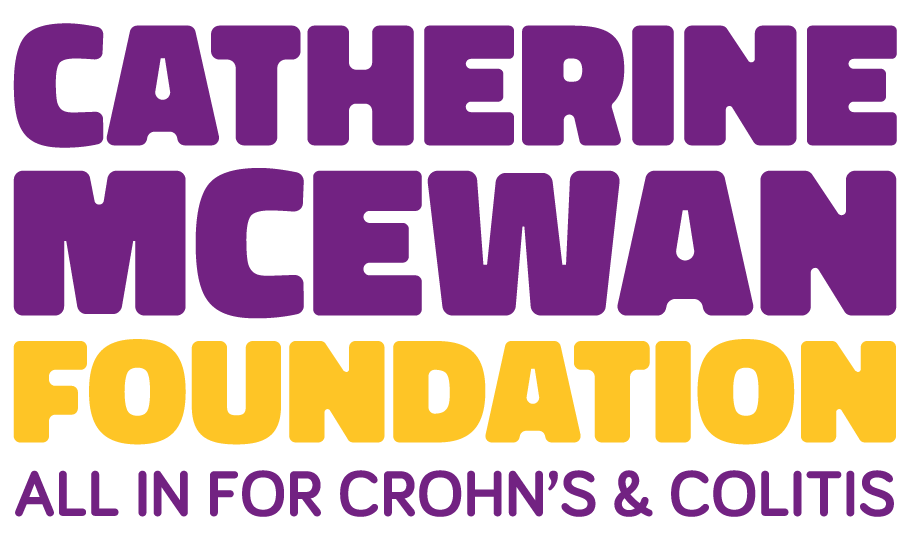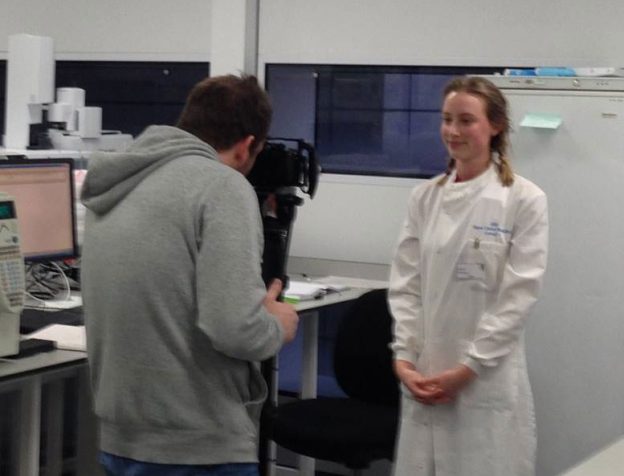AN INTERESTING LOOK AT THE RESEARCH WORK OF MHAIRI MCGOWAN WHO WAS AWARDED THE CATHERINE MCEWAN FOUNDATION FELLOWSHIP
Hello!
I am honoured to have been conducting researching regarding the causation of IBD on behalf of the Catherine McEwan Foundation for the past year or so. The Foundation have enabled such a great opportunity for myself and the others within the Human Nutrition department at the University of Glasgow and the department of paediatric gastroenterology at children’s hospital, who have been extremely dedicated in studying both Crohn’s Disease and Ulcerative Colitis for a number of years. We are thoroughly grateful to be part of such an inspiring charity. I am therefore excited to be able to explain a little bit about the research we do and to ensure you that, because of the hard work and financial input of the Foundation, significant work is ongoing trying to understand these diseases in the hope of developing a treatment or cure.
The majority of research within our IBD research group here in the Glasgow Royal Infirmary and the new Children’s hospital is in studying the human gut microbiota, or put simply; the bugs that live within our tummy. At first, we may think that having bacteria living inside of us is a bit scary but actually, these tiny little “germs” are extremely important to human health and every single one of us are hosts to of trillions of these bugs. They thrive within our gut, especially within the large bowel, because it provides them with warm, oxygen free surroundings and a plentiful food supply from the diet. In return, these bacteria produce lots of useful substances that help us to stay healthy. These substances, specifically called fatty acids, are used by the cells within our bowel to fight off germs and to keep us healthy. Furthermore, they control irritation (inflammation) within the gut.
However, there is a strong notion that patients with IBD do not have a good relationship with the bacteria within their tummy, causing the irritation (inflammation), Until now, it has been hard to study this area as it is extremely hard to identify the bacteria involved and to understand why they might cause such a reaction. However, recent scientific advancements have allowed researchers to make some forward movement in identifying differences between the bacteria of IBD patients and those who don’t have such diseases. Some studies have found that IBD patients have more harmful species of bacteria within their gut which may cause disease, whilst others report that both Crohn’s and Colitis patients have reduced bacterial variety compared to healthy people. Therefore it may be that patients with IBD do not have enough different good (beneficial) bacteria working to keep our guts healthy.
Part of my research was investigating the differences between the bacteria of IBD patients and healthy people. However, a larger and perhaps more important aspect was looking at ways of changing the bugs so they looked like that of a healthy person. The bacteria within our guts use fibre from our diets as food, and different types of bacteria prefer different sources of fibre. So, depending on what type of food we eat, we can selectively grow different types of bacteria. However we do not know if this is possible in Crohn’s and Colitis patients. We decided to use a special experiment to investigate what happened when we provided the gut bacteria of IBD patients’ with different types of fibre.
We investigated this in the lab rather than within patients themselves. The system we used in the lab did however mimic the surroundings inside the body so we could get an idea of what would happen in our tummies. This is like an “out of body” bowel.
We looked at if the bacteria make helpful substances in response to the different fibres in Crohn’s Disease patients, and Colitis patients compared to healthy people. It was found that there was a general trend of reduced helpful substances in those who had IBD. This may help us understand the causes or better ways to treat IBD. It also showed us that those who have already received treatment for their IBD are able to change the healthy substances their bowel’s make but not as much as patients without IBD.
As patients (or relatives of patients) of IBD, I suspect you all have been told by doctors that you may need to change your diet to help IBD. Some of you will have been on Modulen, (a liquid-based diet given to children with Crohn’s Disease). I am sure that most of you who have been on this diet will report that, although you may have missed eating some of your favourite foods, you felt a whole lot better after this treatment. So we already know that diet can influence disease; however this is a complex matter. Fibre is generally thought to be healthy, and as discussed, helps to make helpful compounds in our bowels.
We have now devised a specific diet which, in theory, should have the same effect as Modulen. Alongside his PhD student, Vaios Svolos, and consultant gastroenterologists Dr Richard Hansen, Dr Richard Russell and Dr Dan Gaya. we will be comparing the effects of this diet compared to Modulen in healthy people and in animals. If the results are promising, the team may be able to successfully implement this diet in patients, which would be very exciting indeed.
Throughout my research, I have been continually inspired by the people working around me; the academic researchers, clinicians, IBD nurses and dietitians… It is clear that there is a strong team in Glasgow both on the front line looking after patients, and behind the scenes conducting the all-important IBD research. I feel assured for the patients that I have met that they are in the most capable hands, and I am proud that I have had a small part in this diligent, passionate and exciting group.
The Catherine McEwan Foundation has obviously been invaluable in streamlining the efforts of this group, from funding our research and providing the necessary, top-of the range equipment to our laboratory, to the recruitment of Lisa, the IBD nurse. For a small, local charity to be able to support this is outstanding and is a strong testament to the efforts of Derek, Jenny and all of the team. I am extremely impressed by the youngsters who front many of the events held by the Foundation- hearing them speak about their experiences with IBD and their involvement in the charity is very humbling. And, despite everything, they do it all with a smile!
I’d like to take a chance to thank all the participants of my study, without whom this research would not be possible. It was great to talk to those who are affected by IBD and really spurred me on with my studies.
On a personal level I cannot thank the Catherine McEwan Foundation enough for allowing me this opportunity. I truly hope that the work we have conducted will help scientists and clinicians understand IBD further.

